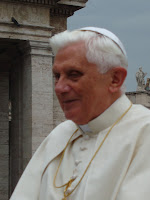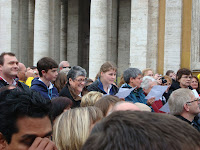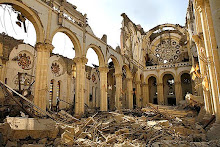Watching the election returns in Italy and learning the identity of the victor I immediately thought of the need for prayer, remembering as I did that, once, another national leader, also with a mellifluous voice and photogenic appearance, blinked, showing weakness in the face of a foreign enemy. The people paid the bill. Pray for strength in righteousness and justice among those who lead us!
We must each avoid judging others in these days of transition. And we must pray first for ourselves that we may be faithful to God and thus work, pray, and sacrifice that our nation will truly pursue justice as well as repent of injustice. I prayed the breviary for our nation and for our leaders. And in the words of Psalm 101 I encountered the presence of the Word Incarnate Himself, who alone can guide and console me:
“I will sing of loyalty and of justice; to thee, O Lord, I will sing.
I will give heed to the way that is blameless. Oh when wilt thou come to me?
"I will walk with integrity of heart within my house; I will not set before my eyes anything that is base. I hate the work of those who fall away; it shall not cleave to me.
"Perverseness of heart shall be far from me; I will know nothing of evil. Him who slanders his neighbor secretly I will destroy.
"The man of haughty looks and arrogant heart I will not endure. I will look with favor on the faithful in the land, that they may dwell with me; he who walks in the way that is blameless shall minister to me.”
Let us be loyal Americans, and good Catholic Christians. Let us pray faithfully and sincerely for our civil leaders, for their good and for our own good as “ one nation under God.” Let us pray for conversion to the cause for life: each and every human life. But let us also “ Render unto God” and go daily to prayer that we may continue to intercede for the voiceless unborn and for conversion of all to the truth that every human person indeed is created with the “ right to life” from the moment of conception. Without the right to life there can be no right also to “ liberty and the pursuit of happiness” for millions of our unborn fellow citizens: brothers and sisters in Christ the Lord and Creator God. In this way we will be a true “ leaven in the world” in fulfillment of our baptismal vocation, our calling to be authentic disciples of Christ.
In keeping with our call to holiness and the source of grace in Christ, our Holy Father charts the way forward for us in his address at the close of the Synod in Rome on the Word of God. Following is part of the text.
“All of us who have taken part in the work of the synod will carry with us the renewed knowledge that the Church’s principal task, at the start of this new millennium, is above all to nourish ourselves on the word of God, in order to make more effective new evangelization, the announcement of our times. What is needed now is that this ecclesial experience reach every community; we have to understand the necessity of translating the word we have heard into gestures of love, because this is the only way to make the Gospel announcement credible, despite the human weaknesses that mark individuals. What this requires first of all is a more intimate knowledge of Christ and an evermore docile acceptance of His word.
“In this Pauline year, making the words of the apostle our own: ‘ I should be in trouble if I failed to [ preach the Gospel]’ ( 1 Cor. 9: 16), I hope with all my heart that in every community this yearning of Paul’s will be felt with ever more conviction as a vocation in the service of the Gospel for the world. At the start of the synod, I recalled the appeal of Jesus: ‘ The harvest is rich’ ( Matt. 9: 37), an appeal we must never tire of responding to whatever difficulties we might encounter. So many people are searching for, sometimes unwittingly, the meeting with Christ and His Gospel; so many have to find in Him a meaning for their lives. Giving clear and shared testimony to a life according to the word of God, witnessed by Jesus, therefore becomes an indispensable criterion to verify the mission of Christ.
“Ongoing efforts to give life to the biblical movement among lay people should be encouraged, along with the formation of group animators, with particular attention being paid to the young. We must also support the effort to allow faith to be known through the word of God to those who are ‘far away’ as well and especially those who are sincerely looking to give a meaning to their lives. . . .
“Many other reflections should be added, but I will limit myself to underlining that the privileged place where the word of God rings out, that builds the Church, as has been said many times during the synod, is undoubtedly the liturgy. In this is where it appears that the Bible is a book of a people and for a people; an inheritance, a testament handed over to readers so that they can put into practice in their own lives the history of salvation witnessed in the text. There is therefore a reciprocal relationship of vital belonging between the people and the Book: The Bible remains a living Book with the people which is its subject which reads it; the people cannot exist without the Book, because it is in it that they find their reason for living, their vocation and their identity."
Christ is the Way. In the “words” of the Scripture, by means of prayerful meditation and wholehearted praise, we encounter and grow in love of the “Word” Himself, our Lord Jesus Christ, above all in the word and sacrament of the Sacred Liturgy. And, in the grace of His love, people of the Eucharist, we are capable of “loving gestures” as His voice, His face, His presence in the world! We are thus “credible” witnesses, calling the world to also believe, as do we, in Jesus Christ as Lord.
(Fr Cusick's column, "A Leaven in the World" is published weekly in
The Wanderer Catholic Newspaper. The above appeared in the 13 November 2008 edition.)


























































